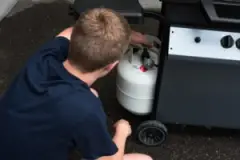
Many residents in Florida use propane tanks for heating their homes, cooking on a gas grill, using a torch, and fueling motor vehicle engines. Most of these applications require some type of propane tank. Because propane is a combustible material, there are several laws outlining the sale, use, and placement of these tanks.
Following these state laws and other regulations could prevent serious injuries, property damages, and other financial losses. If you suffered injuries because of a propane tank failure or explosion, you may have a case against the manufacturer, installer, or property owner. You can learn more by contacting one of our Florida personal injury lawyers for a free consultation.
What Regulations Are There on Propane Tanks in Florida?
Propane tanks are available in various sizes across Florida. This ranges from those that hold a few gallons to over 2,000 gallons of propane. While there are relatively few rules about the use of smaller tanks, there are numerous regulations you should be aware of before installing a larger underground, above-ground, or vertical tank on your property.
First, you must ensure you understand the required space from your home or property line. This depends on the type of tank you are using. According to the Florida Division of State Fire Marshal, larger underground tanks must be at least ten feet from a building or property line. Large above-ground tanks generally require even more space from the building. Vertical tanks can be much closer but placed away from windows and doors.
You should also work with an authorized dealer. Natural gas and propane retailers must obtain a license from the Florida Department of Revenue and follow strict laws as outlined in Chapter 527 of the Florida Statutes. These laws stipulate how they can store, transport, and sell liquid gas. They must follow them closely to ensure consumers remain safe.
Florida Laws About Propane Tank Mishaps
There are also regulations in place to protect you from harm if something goes wrong. These include:
- There is an added chemical that gives the gas a rotten egg smell if there are leaks, allowing you to ensure you address a problem
- To ensure safe storage of propane tanks, they are only filled to 80 percent
This is important because the most common ways propane tanks cause injuries is through leaks and explosions

What Causes Propane Tank Injuries in Florida?
Florida law allows for horizontal above-ground tanks, underground propane tanks, and smaller vertical tanks in addition to the smaller tanks you might use for your gas grill or a hand-held torch. A dangerous leak or explosion can occur with any of the tank types.
There are two ways propane tanks explode. These include
Leak and Ignition
When a propane tank leaks, the combustible gas can ignite if exposed to a spark, flames, or high temperatures. This could occur because of a valve failure or because the valve was left open after using a torch or a grill.
Boiling Liquid Expanding Vapor Explosion (BLEVE)
Propane tanks can explode in high temperatures. This is because heat causes the liquid to build pressure until there is no room to expand further. This is called a Boiling Liquid Expanding Vapor Explosion (BLEVE). Built-in relief valves usually prevent this from occurring. However, it is best to take precautions on very hot, sunny days.
What Injuries and Damages Occur Because of Florida Propane Tank Accidents?
The two most common types of civil cases filed against property owners and propane companies are based on personal injuries and property damage. Homes and businesses can suffer severe damage in seconds when a tank explodes, especially if it is not installed at the correct distance.
The injuries that occur because of a propane tank explosion are often catastrophic. They could include severe burns and scarring, loss of limbs, and shrapnel injuries.
The recoverable damages in an insurance claim or lawsuit based on negligence in one of these cases could allow victims to recover compensation for:
- Pain and suffering
- Emotional distress
- Medical care, current and future
- Income losses from missed work
- Reduced ability to work and earn a living
- Property damages
- Miscellaneous expenses with receipts
Some propane tank accidents are fatal. Surviving loved ones may be able to file a wrongful death case against the property owner or another liable party. Justice may be available. Only the victim’s personal representative can act as the plaintiff in these cases under Florida law.

What Should You Do If You Suffered Florida Propane Tank Injuries?
If you suffered injuries because of a propane tank leak, improper placement, lack of warning about the risk of explosion, or other issues, you might have a case against the negligent party. This could be the property owner, propane company, tank installer, tank manufacturer, or another party. An attorney familiar with the Florida propane tank laws can help you determine your legal options.
Having a lawyer on your side to investigate what happened and identify the liable party allows you to focus on treatment and healing. If you suffered devastating property losses, repair or rebuilding might also be covered. It is important to have an advocate on your side through this complex and challenging process. You do not have to try to navigate these claims alone.
Under the state’s statute of limitations, you may have up to two years to sue based on your injuries. However, evidence disappears quickly. You will want to get started on your case long before this deadline arrives. Contact our team as soon as your injuries allow or call us on behalf of a family member with catastrophic injuries.

Discuss Your Legal Options With Our Team for Free Today
Ged Lawyers provides free consultations for victims who suffered injuries or have property damages due to someone else’s negligence. We can investigate the cause of your propane tank accident and may be able to pursue compensation from the at-fault party on your behalf.
Contact us today to get started with your free case review.
